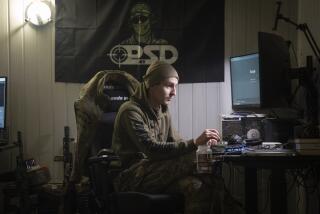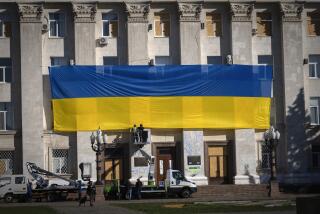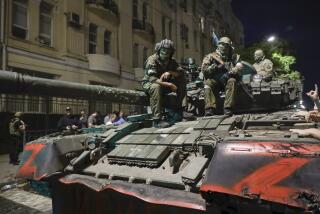Determination Powers Chechen Warrior : Russia: Former taxi driver tells of weeks of death-defying combat with Moscow’s troops.
SHCHELKOVSKAYA, Russia — Matter-of-fact men like Ramzan Maltsegov are the reason the tiny republic of Chechnya has not succumbed to Moscow’s overwhelming military power.
This Chechen secret weapon sat in luxurious relaxation at the food-heaped table of a village family that took him in one recent night. He was not boastful, not impressed with himself.
He was simply a 31-year-old taxi driver who has spent most of the last two months in death-defying combat with Russian troops backed by tanks, howitzers, helicopters and fighter-bombers.
Maltsegov faced them down with a determination bordering on the fantastic.
“They’ll never control the city,” he said of the Russian troops trying to take Grozny, the Chechen capital. “I think in a week or two the city will be cleaned out of them.”
The fighting life he described is the polar opposite of the Russians’ professional orchestration of the war. There is no elaborate chain of command among the Chechens, no formalities, Maltsegov said. Basically, a bunch of guys like him just get together and go out and fight.
“We fight a week, and then another shift comes and we rest,” he said. “A group can be made up of 30 people, or 20 or 50. We have our group, and others have their groups, and we support each other.”
The groups have a commander and deputy commander who get orders from Chechen headquarters, and that is the entire setup, he said. The Chechen fighters appear to link up almost by chance.
“Where there is fighting, we find each other,” he said. They stop when they feel the need.
“I have the right to rest as long as I want, but my conscience won’t let me,” he said. “Twenty-four hours is enough.”
In the past weeks, Maltsegov has fought Russians in the towns of Dolinskoye and Pervomayskaya, in the presidential palace in Grozny and at the Chechen KGB building in the center of town, where he was holed up in a cellar for four days under nonstop Russian bombardment.
Despite the checkpoints at nearly every major intersection on the roads outside Grozny, he has had no difficulty moving in and out of the city, he said. His documents are often checked, and then he is released. He had just been to a nearby village to oversee the burial of a comrade, and was on his way back to the fighting instead of home to his wife and three children.
*
His main enemy, Maltsegov said, is Russian air power. The Chechen fighters have tanks and grenade-launchers and apparently a smattering of artillery, but they have no planes, and their antiaircraft defenses are very weak.
“Our biggest foes are snipers and the air,” he said. “The snipers are nothing, but the air cuts off our oxygen. . . . They can’t find our positions, but they can hit a bazaar or a car or a highway.”
His fellow fighters have figured out how to modify rockets meant for bringing down helicopters to make them powerful enough to hit planes, but with mixed success, he said.
What he and his Chechen brethren like best, Maltsegov said, is fighting Russian troops in the complex territory of Grozny. When Russian tanks and troops tried to storm the capital on New Year’s Eve, the Chechens rejoiced.
*
“We were happy that they came into the city because we couldn’t fight them in an open field,” he said. Chechen irregulars have also intentionally left open the way to the strategic town of Argun, hoping that the Russian armor would move in. But the Russians have failed to rise to the bait.
As for the usual shelling and shooting, it has all become routine for Maltsegov. Except that there is no routine for the Chechens. Sometimes they fight at night, sometimes in the daytime, keeping the Russian troops constantly under strain.
They appear to be succeeding. Several Russian soldiers have commented in recent days that they had not slept the night before because they had been under attack.
“When they relax,” Maltsegov said, “we get started.”
In dozens of days of fighting, he said, the most horrifying moment came when he and five dozen comrades were taking a dinner break near the presidential palace.
They noticed vaguely that a tank was bearing down on them, assuming it was their own, until suddenly one fighter said he suspected the tank was hostile. Before the men could move, it had turned its turret on them and shot into their midst, killing five and wounding two.
The remaining fighters rallied; when they were done with the tank, he said, “only the treads were left.”
More to Read
Sign up for Essential California
The most important California stories and recommendations in your inbox every morning.
You may occasionally receive promotional content from the Los Angeles Times.










